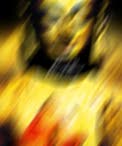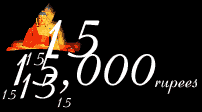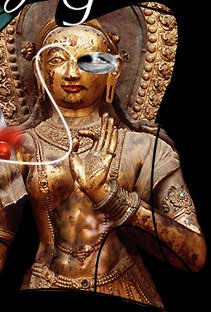
| |
 |
| It was truly aerobic. My heart rate and adrenaline skyrocketed every time I threw back a curtain and walked into one of those dimly lit back rooms, hoping beyond hope that today, today, I'd find it – the Buddha of my Dreams, reasonably priced, beatific, of a decent size, with none of the galling flaws that seemed to crop up in Buddha after Buddha. Because, even though I might agree to buy a filing cabinet with a few surface scratches, or take a discount on an irregular pair of sneakers, I somehow could not reconcile the thought of buying a seriously flawed Buddha – even for ten percent less. The whole concept seemed a loathesome compromise of the goal I had in mind: spending money generously and without regret for an object that had no real use in the occidental scheme of things. |  |
And so, at last, after having eaten up uncounted hours with repeated visits to all the rest, I decided to try the best. I stopped in at the finest, most expensive art gallery in Kathmandu: the Oriental Art Emporium, owned by a black-eyed and cerebral young man named Babukaji. |
| To enter Babukaji's shop was to step into a world utterly removed from the familiar chaos of the ambient street scene. The impudent orchestra of New Road – shouting, honking, whistling and mooing – faded into oblivion as I closed the door behind me. It was almost as if the interior of the gallery created a zone of silence around itself. I blinked, waiting for my brain to adjust to this subdued new esthetic. |  |
| Babukaji sat behind a wide desk cluttered with bills and letters. He was on the phone, speaking in imperative whispers, and nodded briefly to acknowledge my presence. It was impossible to guess his age; he could have been anywhere from twenty-one to forty-five. |
| Babukaji's shop seemed to combine the best qualities of both gallery and shrine. The artworks, displayed in polished and well-lit showcases, were extraordinary. I found my materialistic frenzy loosening, dissolving into puddles of reverence and supplication. I began to suspect what it would mean – in terms of responsibility – to own a truly potent work of devotional art. |
 |
There was a macabre Tibetan ritual cup, fashioned from the silver-lined cranium of a long-dead lama . . . There was an enormous bronze Tara, at least four centuries old, as lithe and athletic as an aerobics instructor . . . There was a fabulous bejeweled Manjushri, flaming sword held menacing and true, whose eyes seemed to follow me around the room . . . There was a gilt statue of Padmasambhava, the great mystic and magician who brought Buddhism to Tibet twelve hundred years ago. The scepter in the saint's hand displayed three impaled heads, demonstrating the seer's complete mastery of the Three Realms of Existence . . . There were yogic saints and dancing Ganeshes; singing brass bowls and Tibetan bells made from long-forgotten alloys; prayer beads carved from human bones; ritual daggers with demonic faces engraved on their hilts. |
There was everything anyone could possibly wish for, except a statue of the Buddha.
Babukaji had ended his conversation and crept up silently behind me, catlike, catching me off guard. In a lame attempt to sound casual, I began to prattle uncontrollably. |
`Well – gee, I don't know. You've got some beautiful stuff here, no doubt about it, but I'm frankly sort of disappointed by the selection. I mean, aren't you a bit short on Buddhas? After all, this is Nepal, Buddha was born here, so I guess I figured you'd have at least a couple of really top-notch statues; nothing sloppy, mind you, but a really sweet little – ’
Babukaji raised his palm, and I screeched to a halt.
|
He walked behind a low display case, parted a maroon curtain, and vanished into a back room. I heard a drawer squeaking open; the jangle of keys; the snap of a lock; another creak. Then Babukaji reappeared, carrying a small parcel completely mummified in rice paper and tied with string - like a Nepali Maltese Falcon. He set it down on a countertop and removed the wrappings. The chemistry was immediate, complete and devastating. |
 |
 |
For several minutes I could not speak. My ears were ringing; the shop seemed to go soft-focus around me. I felt like a kid at Christmas time, staring through a frosted windowpane at the Flexible Flyer of his dreams. Images of coasting fearlessly across the thin ice of this particular lifetime, my new Buddha by my side, danced giddily in my head. I dreamed of the ease and speed with which we would sleigh, the Buddha steering, around the stumps and moguls of samsara – illusion and suffering – that lay all along life's twisting path. `I'll take it,’ I said. |
There was a brief, strained silence. I turned around to face Babukaji and repeated my claim.
|
 |
This was the very moment that I'd been waiting for: the chance to cast off an entire childhood of operant conditioning with a single, devil-may-care gesture. A little smile crossed my lips. `Ah, c'mon, tell me. You might be surprised. How much?’ Babukaji smiled as well.
|
My mouth dropped open. I barked out a laugh; there had to be a mistake. Numbers, I knew, were always a point of confusion for non-native speakers. `Write it down,’ I insisted. And he did, slowly and carefully: a one, a five, a comma and three zeroes.
|
 |
I whipped out my pocket calculator and divided by 22.5, the going exchange rate. `But – but – that comes to $666.66666! I'd have to be sick to spend that much money on a Buddha! Whew! Hey!’ I slapped my forehead, feeling much like the fall guy in some dumb situation comedy. `You've got to be kidding!’ |
I paced around the shop as Babukaji rewrapped the statue, dividing the figures again and again in the hope that I had made some grievous error with the mathematics. But no – that devilish row of sixes continued to display itself, with an impassivity that was itself almost Buddhalike. `Heh!’ I croaked. The wisest thing to do, without a doubt, was to put this insane temptation behind me as quickly as possible. But not quite yet. |
 |
`Listen,’ I muttered imploringly. `Let me just have one last look.’ Babukaji did not blink an eye; he calmly unwrapped the Buddha once more and placed it in my hands. Although barely twenty centimeters high it was, truly, a marvelous work of art. Babukaji knew; he knew that I knew. At one point I took a breath, right on the verge of bargaining. But when our eyes met, Babukaji gave his head the merest shake. It was sufficient; I said nothing. |
|
|
 |